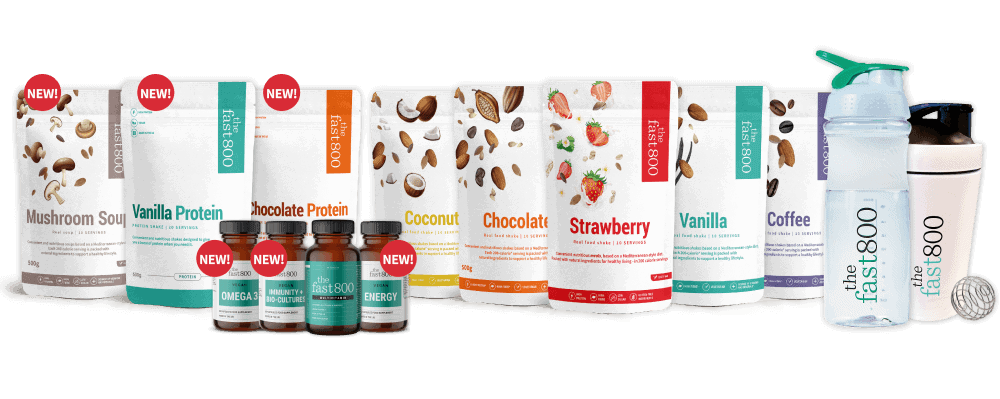5 Signs You’re Not Eating Enough Protein
Protein is an essential macronutrient, needed for maintaining bone health, boosting the metabolism and reducing your risk of chronic health issues like osteoporosis and cardiovascular disease.1,2 We recommend eating 60g of protein every day to ensure you’re optimally nourished, regardless of whether you are following a keto, 5:2, or 800 calorie diet.
If you are consuming 800 calories a day, it can take a little more planning to hit that target. Lean, low calorie protein sources like chicken or fish are great options, but we know it’s not always possible to pre-prepare protein-rich meals. This is why we created our range of low-calorie protein powders and protein bars that are convenient and provide up to a third of your recommended daily intake in just one serving. Explore the full range of products and flavours here.
Discover The Fast 800 range of protein products to support weight loss and fasting, and start your nutrition journey with your best foot forward!
SHOP NOW
Signs you’re not eating enough protein
1. Frequent feelings of hunger
Protein increases satiety and decreases hunger, helping you stay full between meals. Studies have shown it causes a reduction in the hunger hormone ghrelin, and that inadequate dietary protein increases hunger and the desire to eat in an attempt to replenish protein stores.3,4 This can lead to overeating and weight gain. Therefore, finding high protein products like The Fast 800 bars and shakes can help stave off hunger and support a healthy weight loss journey.
2. Fatigue and mood dips
Studies have shown that protein deprivation decreases energy intake while increasing energy expenditure, leading to feelings of fatigue.5,6 Additionally, amino acids, the building blocks of protein, help to regulate the production of the neurotransmitters dopamine and serotonin, which in turn help to regulate and lift mood.7 This means that if you’re not eating enough protein, your energy levels and production of happy hormones may deplete, leading to dips in mood and symptoms of depression.
3. Weak hair, skin and nails
These parts of the body are made up of the proteins collagen, keratin and elastin, so if you’re not getting enough protein in your diet, you could see your skin, nails and hair suffer. As the body diverts the minimal amount of protein it’s given to more vital functions, you may find you begin having brittle or thinning hair, flaky and dry skin and ridges in your fingernails.8
4. Loss of muscle mass
When the body is not receiving enough dietary protein, it can begin taking it from muscles to help preserve more vital tissue, leading to muscle wastage.9 One study found that it takes just one week of inadequate protein to negatively impact skeletal muscles, like the ones that control posture and movement.10 Utilising a protein supplement like The Fast 800 Protein Powder can support a weight loss journey, while also helping with the maintenance of muscle mass.
5. Increased sugar cravings
Protein helps to slow the release of sugar into the bloodstream, so when we don’t eat enough our blood sugar will begin rising and falling at abnormal rates. The result is your body craving quick energy from sugar to try and stabilise your levels again, leading to a vicious cycle.11 So, if you experience regular sugar cravings, it might be worth looking at your protein intake first. Thankfully, our protein products come in deliciously sweet flavours, like vanilla and chocolate, to help satisfy that sweet tooth, while giving your body what it actually needs. Win-win!
Try our range of protein products here, including tasty protein bars and delicious protein powder shakes, to help you hit that 60g protein target to keep you energised and satiated all day.
Hannan, M.T., Tucker, K.L., Dawson-Hughes, B., Cupples, L.A., Felson, D.T. and Kiel, D.P. (2000), Effect of Dietary Protein on Bone Loss in Elderly Men and Women: The Framingham Osteoporosis Study. J Bone Miner Res, 15: 2504-2512. https://doi.org/10.1359/jbmr.2000.15.12.2504
Appel LJ, Sacks FM, Carey VJ, et al. Effects of Protein, Monounsaturated Fat, and Carbohydrate Intake on Blood Pressure and Serum Lipids: Results of the OmniHeart Randomized Trial. JAMA. 2005;294(19):2455–2464. doi:10.1001/jama.294.19.2455
Lejeune MP, Westerterp KR, Adam TC, Luscombe-Marsh ND, Westerterp-Plantenga MS. Ghrelin and glucagon-like peptide 1 concentrations, 24-h satiety, and energy and substrate metabolism during a high-protein diet and measured in a respiration chamber. Am J Clin Nutr. 2006 Jan;83(1):89-94. doi: 10.1093/ajcn/83.1.89. PMID: 16400055.
Apolzan JW, Carnell NS, Mattes RD, Campbell WW. Inadequate dietary protein increases hunger and desire to eat in younger and older men. J Nutr. 2007 Jun;137(6):1478-82. doi: 10.1093/jn/137.6.1478. PMID: 17513410; PMCID: PMC2259459.
Pezeshki A, Zapata RC, Singh A, Yee NJ, Chelikani PK. Low protein diets produce divergent effects on energy balance. Sci Rep. 2016 Apr 28;6:25145. doi: 10.1038/srep25145. PMID: 27122299; PMCID: PMC4848496.
Neto AWG, Boslooper-Meulenbelt K, Geelink M, van Vliet IMY, Post A, Joustra ML, Knoop H, Berger SP, Navis GJ, Bakker SJL. Protein Intake, Fatigue and Quality of Life in Stable Outpatient Kidney Transplant Recipients. Nutrients. 2020 Aug 14;12(8):2451. doi: 10.3390/nu12082451. PMID: 32824065; PMCID: PMC7469059.
Sheikhi A, Siassi F, Djazayery A, Guilani B, Azadbakht L. Plant and animal protein intake and its association with depression, anxiety, and stress among Iranian women. BMC Public Health. 2023 Jan 24;23(1):161. doi: 10.1186/s12889-023-15100-4. PMID: 36694166; PMCID: PMC9872399.
Rushton DH. Nutritional factors and hair loss. Clin Exp Dermatol. 2002 Jul;27(5):396-404. doi: 10.1046/j.1365-2230.2002.01076.x. PMID: 12190640.
Campbell WW, Trappe TA, Jozsi AC, Kruskall LJ, Wolfe RR, Evans WJ. Dietary protein adequacy and lower body versus whole body resistive training in older humans. J Physiol. 2002 Jul 15;542(Pt 2):631-42. doi: 10.1113/jphysiol.2002.020685. PMID: 12122158; PMCID: PMC2290421.
Thalacker-Mercer AE, Fleet JC, Craig BA, Carnell NS, Campbell WW. Inadequate protein intake affects skeletal muscle transcript profiles in older humans. Am J Clin Nutr. 2007 May;85(5):1344-52. doi: 10.1093/ajcn/85.5.1344. PMID: 17490972; PMCID: PMC2447912.
Leidy HJ. Increased dietary protein as a dietary strategy to prevent and/or treat obesity. Mo Med. 2014 Jan-Feb;111(1):54-8. PMID: 24645300; PMCID: PMC6179508.









